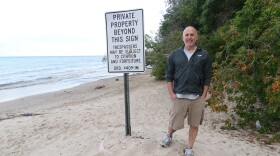Election officials are encouraging people to vote by mail, saying it's the safest voting option during the coronavirus pandemic. But President Donald Trump and other Republicans are making unfounded claims that mail-in ballots are a set-up for fraud.
Some voters are also worried about mail-in ballots getting lost or not delivered based on the April 7 election, when Wisconsin held an election in the chaos of a new pandemic and a series of last-minute legal changes.
Claire Woodall-Vogg is the new executive director of the city of Milwaukee Election Commission. We spoke with her about the changes the commission has made to ensure there won't be a repeat of the April election.
What steps are the city and state taking to ensure ballot security and efficiency?
"We now have what's called an intelligent mail barcode on the outgoing ballots, where we can track them within the postal system and see if there's any abnormalities where maybe ballots are being delayed and see if there's any trends," says Woodall-Vogg. "We've also expanded our drop box locations and our early voting schedule so that voters can return their ballot directly to the election commission so that they know we received it, especially during that last week before the election."
How much of a problem is voter fraud in Wisconsin elections?
"A lot of the conversation around election fraud and mail-in ballots is completely unsubstantiated," says Woodall-Vogg. She says the amount of voter fraud is negligible, a fraction of a percent.
She says that each ballot is tracked and has a paper trail so that any attempt at voter fraud could be stamped out before the ballots are even attempted to be cast.
She adds that it's a felony in Wisconsin to tamper with anyone's absentee ballot, and it's easy to identify tampering because of the election administration systems in place.
"One thing I would like to make voters aware of is, we could experience a delay in the election results on election night because it does take time to count absentee ballots and we can't start until 7 a.m. on Election Day, and we have had unprecedented volume of absentee ballots. So I don't want anyone to think that a delay in the election results is at all associated with the validity of those election results," she says.
U.S. Attorney General William Barr made a claim in a June New York Times Magazine article that foreign countries can easily make counterfeit ballots, put names on them, and send them in — NPR later debunked that as a false claim. Can you explain why it's not possible to do that and why election officials in Milwaukee have debunked that assertion?
Election clerks track every ballot that's issued. When a voter is issued an absentee ballot, their name is listed and tracked in a secure database, says Woodall-Vogg. Every ballot is given a mailing ID, a unique barcode that gets scanned when it's returned to the clerk. Without that ID, the ballot won't be counted, she explains.
So, Woodall-Vogg says counterfeiters could not create a fake ballot and envelope that could be counted, because it would not match up with the absentee request in the database for that particular voter.
What do you say to people who say they don't trust mail-in ballots to arrive in time or be counted properly because of flaws in the system?
"If someone's going to plan to vote by mail, especially for November, they should be making their plan ahead of time and go ahead and apply for an absentee ballot," she says. "The most important thing is not to be relying on the absentee ballot deadline as your deadline to apply for an absentee ballot."
The deadline to apply for an absentee ballot is the Thursday before each election. But, as Woodall-Vogg says, they can't get you a ballot, have you fill it out, and mail it back in that short amount of time. It's recommended that you request an absentee ballot at least two weeks before an election, but ballots can be received as far out as six weeks.
>>How Wisconsin's 23,000 Rejected Absentee Ballots Could Spell Trouble For The November Election
After the April 7 primary, there were reports of tubs of ballots going missing and ballots not being delivered or returned on time. What are the city and the state doing to ensure that these types of incidents don't happen in the future?
Before the Aug. 11 election, the commission was using a third-party mailing service. But it decided to eliminate the third-party service to increase the information about where ballots are at all times.
"The only two parties involved in the mailing of the absentee ballot for November will be the city of Milwaukee Election Commission and the United States Postal Service," she says.
The commission also tried to update its database to avoid errors that occurred in April.
"If a voter has requested a ballot and they haven't received it within a week, we always encourage them to call us so that we can look into it and as well as issue them a new ballot," Woodall-Vogg says.
Is there anything else that voters need to know about voting by mail?
"The key takeaway for absentee voting by mail is not to delay. If you plan to vote by mail, go ahead and request your ballot," says Woodall-Vogg. "If you don't return your ballot, you can always go to an in-person early voting location or to your polling place on Election Day. But it would be better to have that ballot in hand if you decide to vote absentee by mail and not leave it to the last minute."







